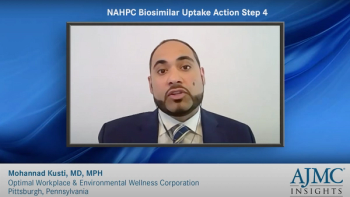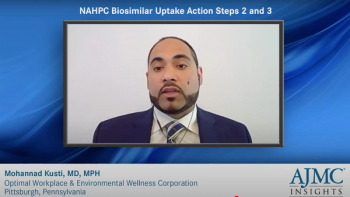
Employers
Latest News

Latest Videos

CME Content
More News

Karen Kobelski is the vice president and general manager of clinical surveillance, compliance & data solutions at Wolters Kluwer. She brings more than 25 years of experience to her position, which expands her previous leadership role over the Safety & Surveillance group to also include the Health Language portfolio of data normalization solutions.

Experts Discuss How Expanding Traditional Value Frameworks Can Address Inequities in Health Outcomes
Expanding traditional value frameworks to include inequality and factors that contribute to this is the first step to addressing disparities in health outcomes. Utilizing multi-criteria decision analysis and distributional cost effect analysis can assist in deriving data and subsequently acting on these issues.

As chief quality officer for Allegheny Health Network, Brian M. Parker, MD, is responsible for ensuring that the highest standards of patient care quality, safety, and service excellence are achieved.

When 40th Midwest Business Group on Health (MBGH) Annual Conference meets this week, stakeholder groups will tackle issues within population health and precision medicine, and discuss the influence of employers on these discussions.

In a webinar by the Integrated Benefits Institute, an employer panel discussed perspectives, initiatives, and challenges in their respective caregiving benefits, as well as how the current pandemic has impacted their strategies.

Of the top 10% considered high cost from an overall cohort of 21 million, a recent study by Milliman found that 57% of this high-cost group had a mental health or substance abuse diagnosis. This behavioral subgroup was shown to contribute to 44% of all health care spending, said Henry Harbin, MD, leading behavioral health expert and adviser to The Bowman Family Foundation.

Through a new cost-saving provision made possible by the recent COVID-19 relief CARES Act, consumers can now utilize flexible spending arrangements and health savings accounts to purchase cost-effective over-the-counter medications.

Going into the COVID-19 pandemic, previous studies by Milliman found a worsening over the past 5 years of access to inpatient intermediate levels of care and office-based care, said Henry Harbin, MD, leading behavioral health expert and adviser to The Bowman Family Foundation.

In 2 surveys, employers identified efforts to increase availability of virtual care, support employees undertaking greater caregiving roles, and address social and health inequities as a result of the pandemic.

Through the partnership between Innovaccer and Emtiro Health, data utilization will work to delineate and address social aspects known to affect the health of populations nationwide, said Kelly Garrison, CEO at Emtiro Health, and Paul Grundy, MD, chief transformation officer at Innovaccer.

Given the constraints prevalent post-COVID-19, Dr Mark Fendrick, director of the University of Michigan Center for Value-Based Insurance Design, stresses that it is now more important than ever for the health care industry to prioritize payment reform, value-based benefit design, and novel policy initiatives.








By increasing access and awareness of mental health services, employers can assist in addressing concerns precipitated by pandemic and racial injustice to curb potentially severe and persistent mental illness, said Joe Grasso, PhD, clinical director of partnerships at Lyra Health.

Beyond telework, some notable strategies that employers should consider when managing back-to-school and other leave related concerns among employees include child care benefits and flexible work options, said David Weisenfeld, JD, legal editor and host of a XpertHR podcast.

Hinge Health announced the expansion of its clinical and technical musculoskeletal (MSK) capabilities to cover the full continuum of MSK care. The move will provide the most complete back and joint health solution to employers and health plans.

The COVID-19 pandemic spotlighted the lack of preparation and notable disruptions in the US health care delivery system. To optimally transition to delivering high quality and affordable care, findings from a report by the National Alliance of Healthcare Purchaser Coalitions and the Council for Accountable Physician Practices (CAPP) suggest that enhanced care coordination, greater investment in delivery systems and primary care, and aligning reimbursement with patient outcomes is warranted, said Norman Chenven, MD, vice chairman of CAPP.

Through GoMo Health’s partnership with the Center for Health Technology and Innovation (CHTI) at the American Heart Association (AHA), GoMo, in collaboration with the AHA, has launched the telehealth care coordination solution, known as Concierge Care, a behaviorally-based, patient-centric care solution that can lead to measurable and sustainable population health, said Patrick Dunn, program director of CHTI at the AHA, and Bob Gold, chief executive officer of GoMo Health.

In beginning the first phase 3 clinical trial to examine a vaccine candidate for the coronavirus disease 2019 (COVID-19), Moderna Inc announced that the Trump administration increased funding to expand the trial to 30,000 US participants; employers have considered and some have made it a requirement for employees to sign a waiver to not sue the organization if they are infected by COVID-19 or suffered any injury while working; study finds 1 flu shot can reduce the risk for Alzheimer disease by 17% and 1 pneumonia vaccine before age 75 can reduce the risk by 25%.

In addressing the COVID-19 pandemic, a more active-based approach is warranted among employers to optimize care. Through detailed databases and a greater focus on population health, Paladina Health has promoted this transition to a more informed, value-based health care delivery system, said Kirk Rosin, chief revenue officer of Paladina Health.


















